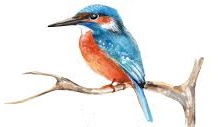Halcyon Days
Written by Anne Newman 21st December 2019 updated 2023

In Irish the kingfisher is also known as biorra an uisce – water spear – in reference to its dagger-sharp bill.
Fourteen days of calm weather were to be expected when the Halcyon was nesting - around the winter solstice, usually 21st or 22nd of December. The Halcyon days are generally regarded as beginning on the 14th or 15th of December.
The name comes from the Latin Alcyone, daughter of Aeolus and wife of Ceyx. Alcyone threw herself into the sea after her husband died in a ship wreck. Her father, Aeolus, was the ruler of the wind and transformed them both into halcyon birds aka kingfishers. So they could fly over the sea. Far away the Polynesians venerated it for having the power of control over the waves and the Maori regarded them as being watchful sentries.
In Greek mythology it is believed that the Halcyon breeds on a floating nest at sea during the winter solstice, charming the wind and waves into a state of calm. However, there is no foundation for this in the natural world, since the bird does not build any kind of nest, but lays eggs in holes by the waterside.

When Alcyone made her nest on the beach, the waves started to destroy it. Aeolus restrained his winds and kept them calm during fourteen days each year so that Alcyone could lay her eggs. These became known as the "halcyon days," when, during the winter, storms do not occur.
Today, the term is used to denote a past period that is being remembered for being happy and / or successful.
It can also refer to a calm period in one’s life, often in the summer of one’s childhood.
“The halcyon days of childhood, a time when everything lay open before him, when the most minor episodes could be construed as events and every chance encounter … gave rise to fresh insights.” Ivan Klima
Shakespeare used the expression in Henry VI, Part I, 1592:
“Assign'd am I to be the English scourge.
This night the siege assuredly I'll raise:
Expect Saint Martin's summer, halcyon days,
Since I have entered into these wars.”





